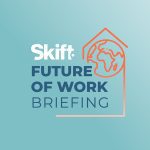Skift Take
The idea seems counterintuitive, but yes, there is actually scope for agencies to be guiding lights in a virtual world.

Future of Work
As organizations start to embrace distributed work and virtual meetings, the corporate travel and meetings sectors are preparing for change. Read Skift’s ongoing coverage of this shift in business travel behavior through the lens of both brands and consumers.
We know most businesses will be cutting back on travel for internal meetings, but it could be the corporate travel agency taking the lead in dissuading customers from taking trips in the future.
One agency, the UK's Capita Travel and Events, met one of its customers, an international bank, this week. The bank, whose name can't be disclosed, brought its “future of working” group, which includes travel, human resources, wellbeing and risk teams, along for some brainstorming.
"We’re doing a workshop for one of our major customers," said Jonti Dalal-Small, head of behavioural science at Capita Travel and Events. "It's an exploratory session. We’ll take them through different frameworks and models, as they think about getting the right mix between virtual and face to face."
Join Us at the Skift Short-Term Rental and Outdoor Summit on May 19
It's been banging the behavioural science drum for years, via its smarter working concept, but the pandemic has all of a sudden brought its unique thinking into the limelight. Because hybrid is here to stay, and there are still lots of questions. In the UK, there's no full-time return to the office for more than a million people, according to a BBC poll. On May 5, Google said it was reimagining a hybrid workplace too, despite investing millions in new offices across the U.S. "Some companies will say remote work is fantastic, we’ve got these big savings and we’re not worried about our culture," Dalal-Small said. "At the same time, individuals are burning out. What do you do?" Less is More The flip side to being hyperconnected — exhaustion — is increasingly being noticed. Forget Zoom-free Fridays, some employees are being